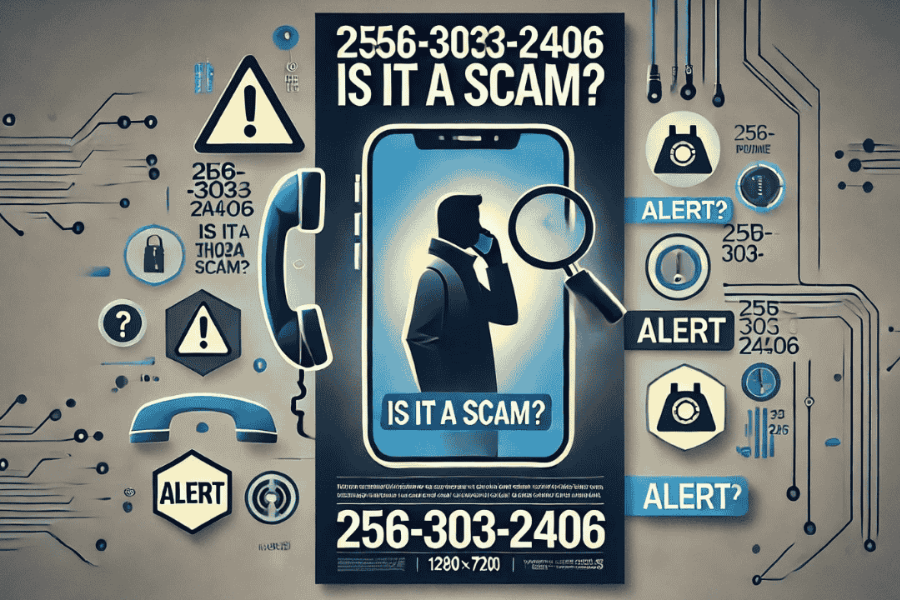256-303-2406 Is It A Scam? Your Complete Guide
In our increasingly digital world, phone scams have become a major issue, affecting countless individuals. One number that has recently caught people’s attention is 256-303-2406 is it a scam. If you’ve encountered this number and find yourself asking, “Is 256-303-2406 is it a scam a scam?” you’re not alone.
This article will delve into the details, helping you determine whether this number is associated with fraudulent activity and how to protect yourself.
What Constitutes a 256-303-2406 is it a scam?
Before we explore the specifics of 256-303-2406 is it a scam, it’s important to define what a scam call is. Typically, a scam call involves an unsolicited phone call, either from a person or an automated system, trying to deceive you into revealing personal information, sending money, or engaging in other fraudulent actions.
Common Types of Scam Calls
- Phishing Calls: Attempts to extract sensitive information like passwords or Social Security numbers.
- Impersonation Scams: Scammers masquerade as government officials, tech support, or representatives from reputable companies to gain your trust and extract money.
- Lottery and Prize Scams: Claims that you’ve won a prize but require payment to claim it.
- Debt Collection Scams: Threatening calls about supposed unpaid debts.
Examining 256-303-2406 is it a scam for Scam Activity
The number 256-303-2406 is it a scam has been reported across various forums as potentially linked to scam operations. Victims have shared experiences of receiving unsolicited calls from this number, which often include:
- Requests for Personal Information: Callers may pose as representatives from legitimate organizations, asking for sensitive details.
- Aggressive Language: Reports indicate that some callers resort to threatening tactics to intimidate individuals into compliance.
- Financial Demands: Scammers may request upfront payments under false pretenses, such as claiming a prize or avoiding legal issues.
Patterns Observed in Reports
Numerous complaints about 256-303-2406 is it a scam highlight common patterns, indicating that this number may be part of a larger scam network. Key observations include:
- Unsolicited Calls: Most individuals reported receiving calls they didn’t expect, which is a significant red flag.
- High-Pressure Techniques: Callers often create a sense of urgency, a common strategy used in scams to cloud your judgment.
- Lack of Verifiable Information: Calls often come from numbers that are hard to trace, making it difficult to verify the legitimacy of the claims.
How to Recognize and Avoid Phone Scams
Being able to identify and evade phone scams is vital for your protection. Here are some useful tips:
- Verify the Caller’s Identity: Always ask for the caller’s name, position, and contact details. Legitimate organizations will provide this information and allow you time to verify it.
- Don’t Share Personal Information: Avoid giving out personal or financial details over the phone unless you’ve confirmed the caller’s identity.
- Hang Up and Call Back: If the caller claims to represent a company you know, hang up and contact the official number listed on their website to verify the call.
- Report Suspicious Calls: Notify the Federal Trade Commission (FTC) or your local consumer protection agency about any dubious calls. This helps authorities track and combat fraudulent activities.
What to Do If You’ve Been Scammed
If you realize you’ve fallen victim to a scam, it’s crucial to act quickly to mitigate any damage and protect yourself from further issues. Here are steps you should take:
- Contact Your Financial Institutions:
- Report the Incident: Immediately inform your bank or credit card company if you disclosed any financial information. They can monitor your accounts for suspicious activity and may reverse fraudulent transactions.
- Freeze or Close Accounts: Consider freezing or closing affected accounts to prevent further unauthorized access.
- Change Your Passwords:
- Update passwords for your online accounts, using strong, unique passwords for each.
- Activate two-factor authentication (2FA) where available for added security.
- Report to Authorities:
- Federal Trade Commission (FTC): File a complaint with the FTC on their website. They gather information on scams and can provide guidance.
- Local Law Enforcement: Report the scam to your local police department. While they may not recover your losses, your report could assist in larger investigations.
- Consumer Protection Agencies: Contact your state’s consumer protection agency for additional support and advice.
- Monitor Your Credit:
- Check your credit reports for any unusual or unauthorized activity.
- Consider placing a fraud alert on your credit report to warn creditors of potential identity theft.
- Inform Credit Bureaus:
- If you suspect your identity has been compromised, report it to the credit bureaus for assistance in managing any fraudulent accounts opened in your name.
- Educate Yourself:
- Familiarize yourself with common scam tactics to better recognize and avoid them in the future. Resources from the FTC and other consumer protection organizations can be beneficial.
- Share your knowledge with friends and family to help them avoid becoming victims.
- Seek Support:
- Being scammed can take an emotional toll. Consider talking to a counselor or support group to address any stress or anxiety related to the experience.
By following these steps, you can address the immediate fallout from a scam and take proactive measures to protect yourself against future fraud.
FAQs About 256-303-2406 is it a scam
Q: How can I tell if a call is a scam?
Look out for unsolicited calls, requests for personal or financial information, and high-pressure tactics. Scammers often employ these methods to deceive you.
Q: What should I do if I receive a suspicious call from 256-303-2406 is it a scam?
Avoid sharing any personal information. Hang up and report the call to the FTC and your local consumer protection agency.
Q: Can scammers use spoofed numbers?
Yes, scammers frequently use technology to spoof phone numbers, making it appear that calls are coming from legitimate sources.
Q: Is it safe to call back a number I don’t recognize?
Generally, it’s best not to call back unfamiliar numbers, especially if they’ve been flagged as suspicious. Instead, verify the number through official channels if necessary.
Conclusion
In summary, the number 256-303-2406 is it a scam has been linked to various scam activities according to numerous reports and user experiences. Recognizing the traits of phone scams and knowing how to safeguard yourself is crucial in avoiding fraud.
Always remain cautious when receiving unsolicited calls, and verify the legitimacy of any requests for personal or financial information. By staying informed and vigilant, you can better protect yourself from potential scams.
Feel free to share this guide to help others recognize and avoid scams related to 256-303-2406 is it a scam. Your awareness can significantly contribute to preventing fraudulent activities.
Stay informed with the latest news and updates on diamondfairybunny!






